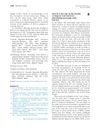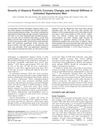
CaBP1 and CaBP2 are necessary for proper hearing and neurotransmission in the ear's inner hair cells.

CaBP1 and 2 are important for maintaining the activity of calcium channels necessary for hearing in inner ear cells.
 June 2023 in “Antioxidants”
June 2023 in “Antioxidants” Lipids from Schizochytrium sp. help prevent hair loss by protecting hair cells from damage and promoting hair growth.
 June 2023 in “Stem cell reviews and reports”
June 2023 in “Stem cell reviews and reports” Stem cell therapies could be a promising alternative for hair loss treatment, but more research is needed to understand their full potential and safety.
April 2021 in “Libyan journal of medical sciences” A woman's hair loss improved with treatment after a COVID-19 infection.
 September 2012 in “Hair transplant forum international”
September 2012 in “Hair transplant forum international” The document concludes with the creation of a Hair Transplant Foundation after reviewing the early hair transplant techniques and discussions from a forum.
September 2022 in “Dermatology and therapy” Androgenetic alopecia is linked to heart disease, metabolic issues, and mental health problems.
 July 2012 in “Hair transplant forum international”
July 2012 in “Hair transplant forum international” Lifestyle choices like stress, smoking, heavy drinking, sun exposure, and chemical hair treatments might speed up hair loss in people with androgenetic alopecia.
 1 citations,
May 2009 in “Annales de Dermatologie et de Vénéréologie”
1 citations,
May 2009 in “Annales de Dermatologie et de Vénéréologie” Environmental factors like smoking, UV exposure, and poor diet contribute to hair loss and graying, and lifestyle changes can help manage it.
 44 citations,
November 2016 in “Journal of The American Academy of Dermatology”
44 citations,
November 2016 in “Journal of The American Academy of Dermatology” The updated SALT II tool offers a more precise way to measure scalp hair loss.
 5 citations,
July 2016 in “Journal of Clinical Hypertension”
5 citations,
July 2016 in “Journal of Clinical Hypertension” Men with severe early-onset baldness may have worse heart artery function and stiffer arteries if they have high blood pressure.
 4 citations,
September 2022 in “Journal of The American Academy of Dermatology”
4 citations,
September 2022 in “Journal of The American Academy of Dermatology” Baricitinib was effective in regrowing hair in patients with different levels of alopecia areata severity.
 4 citations,
February 2020 in “Dermatologic Therapy”
4 citations,
February 2020 in “Dermatologic Therapy” Poor sleep, meat-heavy diets, and junk food worsen hair loss, while sugary drinks may help.
 2 citations,
May 2018 in “Journal of the American Academy of Dermatology”
2 citations,
May 2018 in “Journal of the American Academy of Dermatology” Low vitamin D might be one of several factors involved in the hair loss condition alopecia areata.
 January 2024 in “JEADV clinical practice”
January 2024 in “JEADV clinical practice” The study helps doctors use patient images to understand and apply SALT scores for treating severe alopecia areata.
 August 2023 in “Skin Research and Technology”
August 2023 in “Skin Research and Technology” Measuring bald patch size can help grade hair loss severity, with photograph-based evaluation being more reliable.
 July 2023 in “Dermatology practical & conceptual”
July 2023 in “Dermatology practical & conceptual” The machine learning model effectively assesses the severity of hair loss and could help dermatologists with treatment decisions.
 January 2023 in “Przegla̧d dermatologiczny”
January 2023 in “Przegla̧d dermatologiczny” There are two main types of alopecia areata with different severity, and diagnosis is made through clinical examination and trichoscopy, influencing treatment choices.
 December 2021 in “Benha Journal of Applied Sciences”
December 2021 in “Benha Journal of Applied Sciences” Higher Claudin 3 levels in the blood are linked to more severe alopecia areata.
 April 2021 in “Research Square (Research Square)”
April 2021 in “Research Square (Research Square)” Achieving 80% or more scalp hair regrowth is considered a successful treatment for significant hair loss.
 September 2019 in “Journal of Investigative Dermatology”
September 2019 in “Journal of Investigative Dermatology” Severe Hidradenitis Suppurativa increases missed and unproductive workdays.
 April 2018 in “Journal of Investigative Dermatology”
April 2018 in “Journal of Investigative Dermatology” Both Th1 and Th2 immune responses are increased in alopecia areata, with Th2 response more strongly linked to how severe the disease is.
 86 citations,
May 2011 in “Journal of The American Academy of Dermatology”
86 citations,
May 2011 in “Journal of The American Academy of Dermatology” How bad a woman's hair loss is doesn't always match how it affects her happiness and daily life.
 38 citations,
November 2013 in “Journal of The American Academy of Dermatology”
38 citations,
November 2013 in “Journal of The American Academy of Dermatology” Higher BMI links to worse hair loss in Taiwanese men.
28 citations,
April 2017 in “Journal of cosmetic dermatology” Low vitamin D can worsen pediatric alopecia areata.
 14 citations,
January 2013 in “Hormone and Metabolic Research”
14 citations,
January 2013 in “Hormone and Metabolic Research” The severity of symptoms in nonclassical congenital adrenal hyperplasia is not determined by CYP21A2 gene variations.
 11 citations,
November 2017 in “Electronic physician”
11 citations,
November 2017 in “Electronic physician” Depression severity is not linked to PCOS markers like BMI, insulin resistance, or testosterone levels.
 August 2024 in “Archives of Dermatological Research”
August 2024 in “Archives of Dermatological Research” Acne severity is not related to the type or severity of androgenetic alopecia.
March 2024 in “LGU journal of life sciences” Poor diets worsen PCOS symptoms in young women.
 December 2023 in “Dermatology and therapy”
December 2023 in “Dermatology and therapy” Japanese patients and physicians often disagree on the severity of Alopecia Areata and treatment satisfaction, needing better communication and treatments.


























